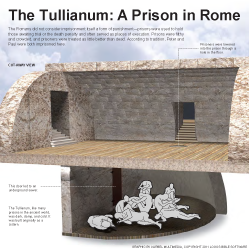1:1–2 Paul begins his letter to the Philippians with a customary greeting identifying himself and the letter’s cosender, Timothy. Paul is writing from prison, perhaps in Ephesus (ad 54–57), Caesarea (ad 58–60), or Rome (early 60s ad). See note on Phil 1:7. |
 Paul: A Life of Redemption and Transformation
Paul: A Life of Redemption and Transformation
Timothy Paul’s frequent companion during his missionary journeys. Timothy was a half-Jewish believer who met Paul in Lystra (Acts 16:1) and worked closely with him in ministry (Acts 16:3; 20:4–5; 2 Cor 1:19; 1 Tim 1:3). As a result, Timothy became like a son to Paul (1 Tim 1:2).
was a half-Jewish believer who met Paul in Lystra (Acts 16:1) and worked closely with him in ministry (Acts 16:3; 20:4–5; 2 Cor 1:19; 1 Tim 1:3). As a result, Timothy became like a son to Paul (1 Tim 1:2).
slaves of Christ Jesus While Paul refers to himself as an apostle in some letters (1 Cor 1:1; 2 Cor 1:1; Gal 1:1), here he refers to himself as a doulos, or “slave,” of Christ (Rom 1:1; Titus 1:1). This description sets up Paul’s later remarks encouraging the Philippians to show humility—an attitude that Jesus Himself demonstrated (Phil 2:3–8).
 Pauline Self-Designations Table
Pauline Self-Designations Table
to all the saints See note on Eph 1:1.
Philippi A city in Macedonia (northeast Greece, today); named after Alexander the Great’s father, King Philip II. Based on Philippi’s likely demographics, the church there would have been almost entirely non-Jewish, non-Roman, and impoverished—perhaps joined by a few middle-class merchants. The believers probably faced severe persecution and economic hardships (see note on Phil 1:29). This scenario corresponds with Paul’s main themes in the letter: suffering and unity (see note on vv. 27–30).
Located about 9 miles inland from the northern shore of the Aegean Sea, Philippi |
overseers The Greek word used here, episkopos, refers to those appointed to watch over, guide, and protect the believers (Acts 20:28). Paul discusses church leadership more fully in his letters to Timothy and Titus (see 1 Tim 3:1–13; Titus 1:5–9).
to watch over, guide, and protect the believers (Acts 20:28). Paul discusses church leadership more fully in his letters to Timothy and Titus (see 1 Tim 3:1–13; Titus 1:5–9).
 Episkopos and Presbyteros Word Study
Episkopos and Presbyteros Word Study
deacons The Greek word used here, diakonos, describes helpers—anyone who carries out ministry work. The early church’s first deacons were selected by the apostles to help distribute food to widows (Acts 6:1–6). See note on 1 Tim 3:8.
 Diakonos Word Study
Diakonos Word Study
1:2 Grace to you and peace from God our father See note on Rom 1:7.
Lord The title of “Lord” (kyrios in Greek) is especially significant in this letter. As a Roman colony, Philippi would have had a prominent cult dedicated to worshiping the emperor. It would have been common for residents—Roman citizens or not—to participate in the imperial religion, even if they worshiped other pagan gods. From public statues to household shrines, the environment of Philippi called for honoring Caesar above all. However, by affirming that Jesus is Lord, Paul challenges the Philippian Christians to redirect their allegiance. Compare Phil 2:11.
1:3–11 It was common for Graeco-Roman letters to include a thanksgiving section, but Paul’s language here goes beyond the customary expression of gratitude. Ever since Paul first preached the gospel at Philippi (Acts 16:11–40), the believers there had been among his strongest supporters (Phil 1:5). He thinks of them with warmth and affection (vv. 7–8) and prays that their love and wisdom will grow (v. 9). |
 Prayers in Paul’s Letters Table
Prayers in Paul’s Letters Table
1:3 give thanks Paul continually expresses gratitude for the Philippians and the benefits he received from them.
1:5 participation The Philippians provided financial support that helped Paul spread the gospel message (4:15, 18). Their partnership in his ministry is the reason he prays with joy (v. 4).
from the first day Paul first met the Philippian believers during a missionary journey through Macedonia (Acts 16:11–40). When he departed, the Philippians continued to support him financially (Phil 4:15–16). The Christians at Philippi seem to have aligned themselves strongly with Paul’s missionary endeavors.
1:6 one who began Refers to God. Paul is certain that the Philippians will progress in faith because God is committed to transforming them.
day of Christ Jesus Refers to the second coming of Jesus Christ (see note on 1 Thess 5:2). In Paul’s letters, the “Day of Christ” is synonymous with the ot phrase “Day of the Lord” (see note on Luke 17:22).
1:7 my imprisonment Romans did not use prisons for punishment, but only to detain those awaiting trial or execution.
defense and confirmation of the gospel See note on Phil 1:16.
sharers of grace Probably alludes to the Philippians’ financial support, which aided Paul while in prison and funded his missionary work (compare 4:14–18).
1:9 love As Paul explains later, love (agapē) involves putting others before oneself (2:3–4).
knowledge The knowledge that Paul has in mind is not just intellectual but experiential, acquired through acts of love.
all discernment The Greek term used here, aisthēsis, refers to the ability to make decisions for the benefit of others.
1:10 what is superior When the Philippians’ love abounds, they will be able to determine what is most valuable or beneficial to the community of believers.
sincere and blameless Refers to being without fault.
day of Christ See note on v. 6.
1:11 fruit of righteousness Refers to the natural results of belonging to Christ, whose death and resurrection bring righteousness to all who believe (compare 3:9).
1:12–26 Paul provides an update on his circumstances. First, he describes how his imprisonment has provided opportunities for ministry (vv. 12–18); he then looks ahead to his possible release from prison and to the advance of the gospel—whether he lives or dies (vv. 19–26). |
1:12 brothers The Greek term used here, adelphoi, collectively refers to both male and female believers.
my circumstances Refers to Paul’s imprisonment.
the progress of the gospel Paul’s imprisonment did not mean that the gospel was held captive. On the contrary, those around Paul were captive to hearing his good news about Jesus.
 Euangelion Word Study
Euangelion Word Study
1:13 my imprisonment Although Paul is imprisoned, he does not view himself as being at the mercy of human authority. He has no other master but Christ, who will work out Paul’s circumstances in accordance with His will.
praetorium Refers to a unit of elite Roman soldiers, some of whom functioned as the emperor’s bodyguards; others were stationed throughout the empire. Alternatively, it could refer to a provincial governor’s residence (e.g., Matt 27:27; Mark 15:16; John 18:28; Acts 23:35). Paul’s time in prison allowed these soldiers to hear the gospel message.
1:14 brothers In this case, Paul is referring to fellow missionaries (compare Phil 1:12 and note).
without fear Those tasked with proclaiming the gospel likely had been discouraged by Paul’s imprisonment.
1:15 because of envy and strife preach Christ Describes missionaries who, in Paul’s estimation, saw themselves as his rivals.
1:16 appointed for the defense of the gospel Paul was constantly taking criticism for his view of the gospel—specifically, for not requiring non-Jewish Christians to adopt the Jewish law. In these verses, Paul is contrasting fellow missionaries of goodwill, who recognized his authority and accepted his gospel, and those of envy and ambition, who opposed him (requiring him to defend his approach).
1:18 whether in pretense or in truth Ultimately, Paul rejoices in all efforts to spread the gospel—even the ministries of his detractors.
1:19 deliverance The Greek word used here, sōtēria, means rescue from danger (compare Matt 14:30; Mark 15:31) and often is translated as “salvation” (Acts 4:12; Rom 10:10).
the Spirit of Jesus Christ This phrase parallels the common ot and nt phrase “Spirit of God” (e.g., John 7:39; 1 Pet 4:14; Job 33:4) and links Jesus to God the Father. While often distinguished, the Spirit and Jesus are elsewhere co-identified (see Acts 16:6; Rom 8:9; Gal 4:6; 1 Pet 1:11).
1:20 boldness The Greek word used here refers to bold or courageous speech. Paul plans to continue speaking out for the gospel; he trusts that Christ will be honored regardless of whether he lives or dies.
1:21 to live is Christ and to die is gain As long as he is alive, Paul will be consumed with Christ’s concerns, values, and mission. And if Paul dies, he will be relieved of his suffering and dwell with Christ (Phil 1:23).
1:22 flesh The Greek word used here, sarx, refers in this context to the physical body, but Paul often uses sarx in other ways. See note on 3:3.
fruitful work If Paul continues his ministry, he is certain that he will see more Gentiles come to believe the gospel and be transformed by God’s Spirit.
1:23 to depart and to be with Christ Refers to dying. Christ’s resurrection gives Paul hope in death (3:10–11, 20–21; compare note on Rom 1:4).
1:24 to stay on in the flesh Refers to remaining alive, which Paul knows would be better for his churches.
1:27–30 These verses convey Paul’s main reason for writing to the Philippians—to urge them to stand together for the gospel in the face of persecution and suffering. |
1:27 a manner Paul knows that the way Christians live is important to their witness for the gospel.
standing firm Paul calls on believers to remain faithful to the gospel message through word and deed (Gal 5:1; Eph 6:14; Col 4:12).
contending side by side The believers need to band together as they struggle against hardship and persecution (compare note on Phil 1:29). Christian unity is one of Paul’s major concerns throughout the letter (e.g., 2:2–4; 4:1–2).
1:28 not letting yourselves be intimidated Standing firm together will strengthen the believers and give them confidence.
a sign of destruction Refers to God’s final judgment on the Day of Christ (v. 6 and note). The Philippians’ fearlessness is evidence that God will rule against their adversaries.
of your salvation Refers to the Day of Christ and God’s ultimate act of deliverance for those who put faith in Him.
for those who put faith in Him.
1:29 to suffer on behalf of him People in the Graeco-Roman world who became Christians would have faced all kinds of persecution. The problem people had with Christians was not so much that they were following Christ, but that they were failing to properly worship the community’s gods—especially the emperor.
The problem people had with Christians was not so much that they were following Christ, but that they were failing to properly worship the community’s gods—especially the emperor.
1:30 same struggle Likely refers to the opposition that Paul encountered in Philippi (Acts 16:20–24).

|
About Faithlife Study BibleFaithlife Study Bible (FSB) is your guide to the ancient world of the Old and New Testaments, with study notes and articles that draw from a wide range of academic research. FSB helps you learn how to think about interpretation methods and issues so that you can gain a deeper understanding of the text. |
| Copyright |
Copyright 2012 Logos Bible Software. |
| Support Info | fsb |
 Loading…
Loading…







 Philippi
Philippi 
